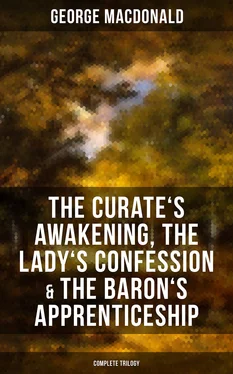Into this garden, Bascombe walked the next morning, after breakfast, and Helen, who, next to the smell of a fir-wood fire, honestly liked the odour of a good cigar, spying him from her balcony, which was the roof of the veranda, where she was trimming the few remaining chrysanthemums that stood outside the window of her room, ran down the little wooden stair that led from it to the garden, and joined him. Nothing could just at present have been more to his mind.
CHAPTER VIII.
THE GARDEN.
Table of Contents
"Take a cigar, Helen?" said George.
"No, thank you," answered Helen; "I like it diluted."
"I don't see why ladies should not have things strong as men."
"Not if they don't want them. You can't enjoy everything—I mean, one can't have the strong and the delicate both at once. I don't believe a smoker can have the same pleasure in smelling a rose that I have."
"Isn't it a pity we never can compare sensations?"
"I don't think it matters much: everyone would have to keep to his own after all."
"That's good, Helen! If ever man try to humbug you, he will find he has lost his stirrups. If only there were enough like you left in this miserable old hulk of a creation!"
It was an odd thing that when in the humour of finding fault, Bascombe would not unfrequently speak of the cosmos as a creation. He was himself unaware of the curious fact.
"You seem to have a standing quarrel with the creation, George! Yet one might think you had as little ground as most people to complain of your portion in it," said Helen.
"Well, you know, I don't complain for myself. I don't pretend to think I am specially ill-used. But I am not everybody. And then there's such a lot of born-fools in it!"
"If they are born-fools they can't help it."
"That may be; only it makes it none the pleasanter for other people; but, unfortunately, they are not the only or the worst sort of fools. For one born-fool there are a thousand wilful ones. For one man that will honestly face an honest argument, there are ten thousand that will dishonestly shirk it. There's that curate-fellow now—Wingfold I think aunt called him—look at him now!"
"I can't see much in him to rouse indignation," said Helen. "He seems a very inoffensive man."
"I don't call it inoffensive when a man sells himself to the keeping up of a system that——"
Here Bascombe checked himself, remembering that a sudden attack upon what was, at least, the more was the pity, a time-honoured system, might rouse a woman's prejudices; and as Helen had already listened to a large amount of undermining remark without perceiving the direction of his tunnels, he resolved, before venturing an open assault, to make sure that those prejudices stood, lightly borne, over an abyss of seething objection. He had had his experiences as the prophet-pioneer of glad tidings to the nations, and had before now, although such weakness he could not anticipate in Helen, seen one whom he considered a most promising pupil, turned suddenly away in a storm of terror and disgust.
"What a folly is it now," he instantly resumed, leaving the general and attacking a particular, "to think to make people good by promises and threats—promises of a heaven that would bore the dullest among them to death, and threats of a hell the very idea of which, if only half conceived, would be enough to paralyse every nerve of healthy action in the human system!"
"All nations have believed in a future state, either of reward or punishment," objected Helen.
"Mere Brocken-spectres of their own approbation or disapprobation of themselves. And whither has it brought the race?"
"What then would you substitute for it, George?"
"Why substitute anything? Ought not men be good to one another because they are made up of ones and others? Do you or I need threats and promises to make us kind? And what right have we to judge others worse than ourselves? Mutual compassion," he went on, blowing out a mouthful of smoke and then swelling his big chest with a huge lungsful of air, "might be sufficient to teach poor ephemerals kindness and consideration enough to last their time."
"But how would you bring such reflections to bear?" asked Helen, pertinently.
"I would reason thus: You must consider that you are but a part of the whole, and that whatever you do to hurt the whole, or injure any of its parts, will return upon you who form one of those parts."
"How would that influence the man whose favourite amusement is to beat his wife!"
"Not at all, I grant you. But that man is what he is from being born and bred under a false and brutal system. Having deluged his delicate brain with the poisonous fumes of adulterated liquor, and so roused all the terrors of a phantom-haunted imagination, he sees hostile powers above watching for his fall, and fiery ruin beneath gaping to receive him, and in pure despair acts like the madman the priests and the publicans have made him. Helen," continued Bascombe with solemnity, regarding her fixedly, "to deliver the race from the horrors of such falsehoods, which by no means operate only on the vulgar and brutal, for to how many of the most refined and delicate of human beings are not their lives rendered bitter by the evil suggestions of lying systems—I care not what they are called—philosophy, religion, society, I care not?—to deliver men, I say, from such ghouls of the human brain, were indeed to have lived! and in the consciousness of having spent his life in the slaying of such dragons, a man may well go from the nameless past into the nameless future rejoicing, careless even if his poor length of days be shortened by his labours to leave blessing behind him, and, full of courage even in the moment of final dissolution, cast her mockery back into the face of mocking Life, and die her enemy, and the friend of Death!"
George's language was a little confused. Perhaps he mingled his ideas a little for Helen's sake—or rather for obscurity's sake. Anyhow, the mournful touch in it was not his own, but taken from the poems of certain persons whose opinions resembled his, but floated on the surface of mighty and sad hearts. Tall, stately, comfortable Helen walked composedly by his side, softly shared his cigar, and thought what a splendid pleader he would make. Perhaps to her it sounded rather finer than it was, for its tone of unselfishness, the aroma of self-devotion that floated about it, pleased and attracted her. Was not here a youth in the prime of being and the dawn of success, handsome, and smoking the oldest of Havannahs, who, so far from being enamoured of his own existence, was anxious and careful about that of less favoured mortals, for whose welfare indeed he was willing to sacrifice his life?—nothing less could be what he meant. And how fine he looked as he said it, with his head erect, and his nostrils quivering like those of a horse! For his honesty, that was self-evident!
Perhaps, had she been capable of looking into it, the self-evident honesty might have resolved itself into this—that he thoroughly believed in himself; that he meant what he said; and that he offered her nothing he did not prize and cleave to as his own.
To one who had read Darwin, and had chanced to see them as they walked in their steady, stately young life among the ancient cedars and clipped yews of the garden, with the rags and tatters of the ruined summer hanging over and around them, they must have looked as fine an instance of natural selection as the world had to show. And now in truth for the first time, with any shadow of purpose, that is, did the thought of Helen as a wife occur to Bascombe. She listened so well, was so ready to take what he presented to her, was evidently so willing to become a pupil, that he began to say to himself that here was the very woman made—no, not made, that implied a maker—but for him, without the MADE; that is, if ever he should bring himself by marriage to limit the freedom to which man, the crown of the world, the blossom of nature, the cauliflower of the spine, was predestined or doomed, without will in himself or beyond himself, from an eternity of unthinking matter, ever producing what was better than itself in the prolific darkness of non-intent.
Читать дальше












